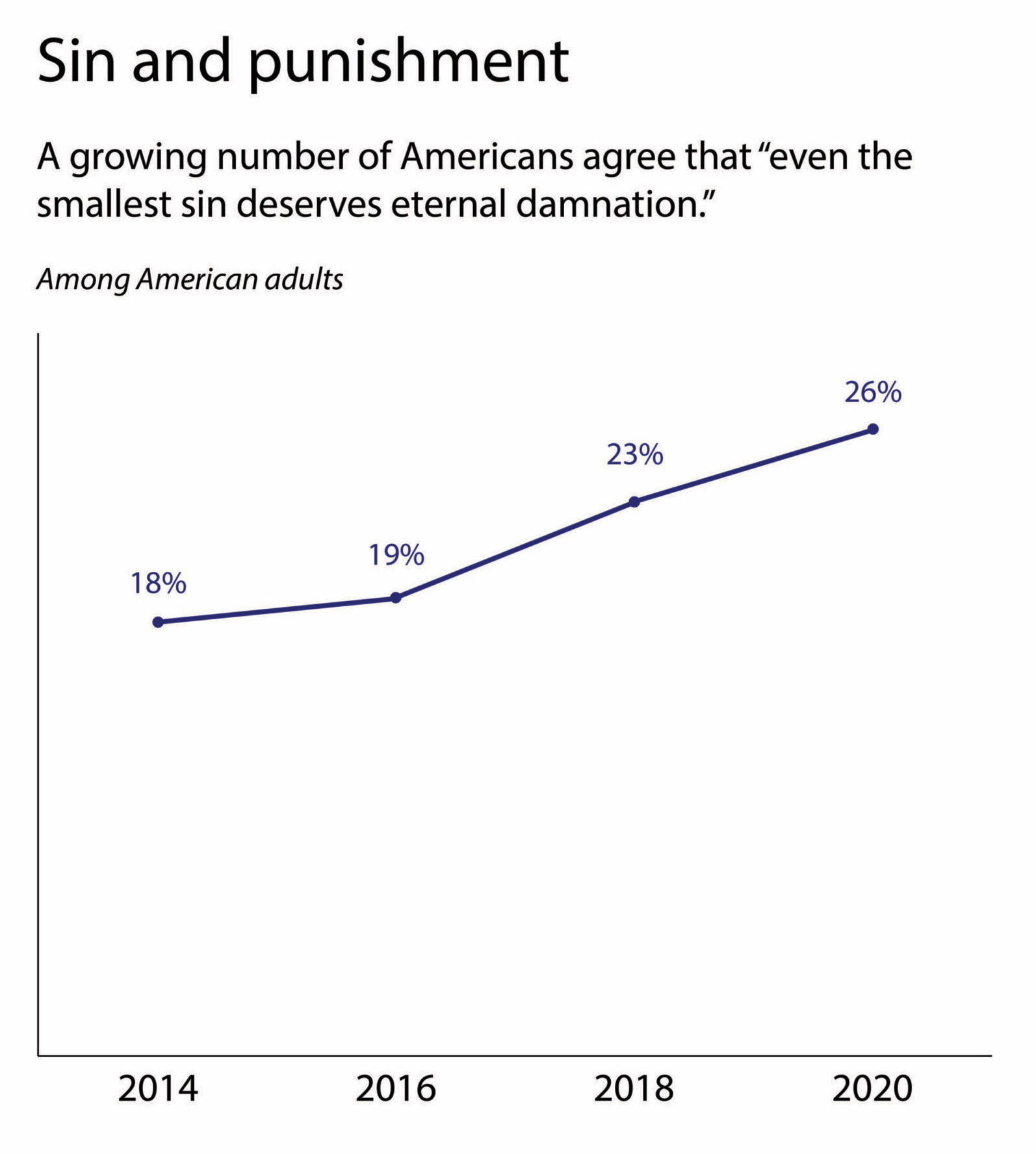
By Aaron Earls
Hell may not be a bad word anymore.
Lifeway Research’s 2020 State of Theology study found 56% of Americans believe hell is a real place where certain people will be punished forever. Belief in the biblical place of judgment has been steady since 2014 in the biennial study.
The State of Theology also identified a steady increase in the percentage of Americans who agree that “even the smallest sin deserves eternal damnation.” In 2014, 18% agreed, but that has risen steadily up to 26% of Americans in the 2020 study.

“The doctrine of hell, just like the doctrine of heaven, has staying power because it is so clearly grounded in Scripture and so prominent in the teachings of Jesus,” says Chris Morgan, professor of theology at California Baptist University and editor of several works on hell. “It is not the product of a culture, or some holdover relic from American fundamentalism. Hell is what the historic and global church has consistently affirmed.”
Hell is not the product of a culture, or some holdover relic from American fundamentalism. Hell is what the historic and global church has consistently affirmed. — @csmorgn Click To TweetFor Morgan, the belief in hell will last because it is intertwined with the core of Christianity. “Those holding to the uniqueness of Jesus and the necessity of salvation through faith in Him will hold to hell,” he says. “They will sense the interrelationships of God’s justice, sin, the cross, forgiveness, and future punishment.”
Unsurprisingly, Americans with evangelical beliefs are more likely than non-evangelicals to hold to concepts like hell and eternal damnation. Regular churchgoers are also more likely to believe in hell. Some of the other groups holding to the idea of eternal damnation, however, may be surprising.
Younger Americans are more likely to hold to the historical Christian beliefs. Americans age 18-34 (29%) and 35-49 (32%) are more likely to agree than those 50-64 (21%) and 65 and older (18%) that even the smallest sin deserves everlasting punishment. Specifically on the existence of hell, 60% of those under 50 say hell is a real place where certain people will be punished forever, while 51% of those 50 and over agree.
Younger Americans are more likely to believe traditional Christian doctrines surrounding hell and eternal judgment. Click To TweetJoshua Butler, pastor of Redemption Tempe near Arizona State University, says some of the passions and experiences of the next generation make them more prone to recognize a need for justice and judgment beyond death.
“Justice is a strong ideal for younger Americans, and social media has exposed both the ethical failings of prominent leaders and the rampant extent of abuses and misuses of power in society as a whole,” says Butler, author of The Skeletons in God’s Closet: The Mercy of Hell, the Surprise of Judgment, the Hope of Holy War. “I believe this cultural sensitivity to injustice has contributed to an increasing acceptance of eternal punishment for younger generations, a hope that true reckoning still awaits.”
The cultural sensitivity to injustice has contributed to an increasing acceptance of eternal punishment for younger generations, a hope that true reckoning still awaits. — @butlerjosh Click To TweetMorgan agrees that the sense of justice in our current context underlines the reality of God, sin, the image of God and more concepts from Scripture. He also says it raises important questions: “How can we call something unjust without a sense of what is just? And how do we have a sense of the just without God? How could it be just for Hitler to not suffer? How could it be that oppressors have the same fate as the godly?”
With these questions circling around, Butler says Christians have an opportunity to discuss the true nature of hell and the gospel that provides an escape. “Jesus relates hell not only to extreme acts of injustice, but to the deeper vices of the human heart which drive such behavior—like pride, lust, rage, and greed (Matthew 5),” he says. “We want to rightly prune back the branches of wicked trees in our world, like sex-trafficking for example, while Jesus wants to dig out the root of things like lust and greed. We want to put boundaries on the wildfire of genocide; Jesus has come to snuff out the sparks of rage and pride. Jesus cares about justice even more than we do.”
We want to rightly prune back the branches of wicked trees in our world, while Jesus wants to dig out the root. Jesus cares about justice even more than we do. — @butlerjosh Click To TweetJesus’ concern for justice reveals what Morgan calls one of the biggest misconceptions about hell—that it is only for “other people, not normal sinners.” He says people “assume that only extremely evil people go there, whereas the Bible teaches that only those who trust Christ go to heaven. Of those who believe in hell, how many fear that they themselves might go there?”
An additional Lifeway Research study suggests most aren’t thinking about that, but a growing number are. Close to half of Americans 45% say at least once a year they wonder, “If I were to die today, do I know for sure that I would go to heaven?” Compared to a 2011 Lifeway Research study, more Americans today say they think about that question daily (15% to 8%) and fewer say they never think about it (37% to 46%).
But while Morgan and Butler believe the doctrine of hell is important and will remain part of Christianity, they also say hell is not the focus. Butler says, “The good news of the gospel is that Jesus’ bore the wildfire power of hell upon the cross, and now his question to us is not, ‘Are you good enough to get into my kingdom?’ but rather ‘Will you let me heal you?’ Jesus has the power to extinguish sin’s hold in our lives through the saturating grace of his Spirit.”
Hell is never the point of Scripture. Jesus is. Sin and hell are the backdrop; Jesus is the focus. — @csmorgn Click To Tweet“Hell is never the point of Scripture,” Morgan says. “Jesus is. Sin and hell are the backdrop; Jesus is the focus. We have offended God; we need forgiveness; we need a Savior. Only Jesus can save. And He will.”








